Setting Up a Playroom for Toddlers
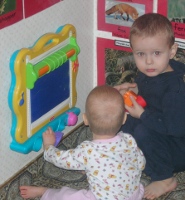 Most mothers of toddlers are foggy, completely exhausted, and can't find a single moment to feel refreshed, aside from possibly nap time, where the mother crashes and takes a nap herself if she is wise. Never mind the husband who comes home to a wife that has nothing left to give. Refreshment is possible for the woman and can lead to a satisfied husband and a more energized mother. A more enriched life is in store for the toddler as well, who learns the secret of what Charlotte Mason calls “focused attention.”
Most mothers of toddlers are foggy, completely exhausted, and can't find a single moment to feel refreshed, aside from possibly nap time, where the mother crashes and takes a nap herself if she is wise. Never mind the husband who comes home to a wife that has nothing left to give. Refreshment is possible for the woman and can lead to a satisfied husband and a more energized mother. A more enriched life is in store for the toddler as well, who learns the secret of what Charlotte Mason calls “focused attention.”
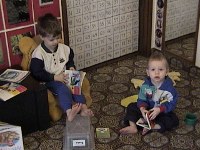 Focused attention is the ability of a child to focus on one activity for an extended period of time. Independent learning cannot take place without focused attention. Setting up a gated-off room where the toddler can play safely and independently is the key to developing this ability. The mother is not in the room. She can spend time with God, read a book, lie down for a bit, or be refreshed in some other way.
Focused attention is the ability of a child to focus on one activity for an extended period of time. Independent learning cannot take place without focused attention. Setting up a gated-off room where the toddler can play safely and independently is the key to developing this ability. The mother is not in the room. She can spend time with God, read a book, lie down for a bit, or be refreshed in some other way.
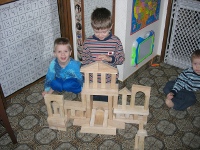 Most toddlers will sinfully throw a fit with rage and anger if you put them in a room where they cannot reach you, especially if you haven't trained them by putting them in a playpen as an infant. But not to worry, you can train a toddler at any age that he is not the king, and he does not rule, and you will not reward him by comforting him when he sins.
Most toddlers will sinfully throw a fit with rage and anger if you put them in a room where they cannot reach you, especially if you haven't trained them by putting them in a playpen as an infant. But not to worry, you can train a toddler at any age that he is not the king, and he does not rule, and you will not reward him by comforting him when he sins.
The easiest way to start is by tape recording your own voice speaking Scriptures you want him to learn, numbers 1 to 100, famous poems, or anything else that you would like for him to learn. Play this cassette after you have set out a fun activity for your child (like Duplo Legos he hasn't seen for a week.) The room needs to be set up in such a way that there are other open-ended activities attached to the wall so that if he loses interest in one thing, he can go to the Magna Doodle bolted to the wall and scribble for a while. Or he can go look at the animal pictures on the wall, or the hundred chart, or the world map, or the full-length mirror. There should be a hideaway area, like a cupboard, tent, or playhouse. My own playroom was connected to the kitchen, so it had a built-in cupboard low to the ground. My husband carpeted the cupboard with a leftover remnant from our bedroom carpet. 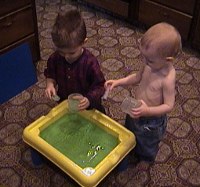 You can make it cozy and fun. Once I stapled up a poster of star constellations, and there was a flashlight in the corner. The toddler would shut the cupboard doors, turn on the flashlight, and enjoy the star constellations. I also had a plastic desk that opened up, so I would rotate what I put in there. I had a small sand and water table that was empty, unless the activity was sand. (I had to be there for the water activities, so I didn't use water activities for independent play time.) I would let the toddler play with funnels, measuring cups, and measuring spoons in the sand. Then after 20 minutes or half an hour, I would come in and scoop most of the sand up off the carpet with a scoop, then vacuum the room. It's incredible how quiet a child can be when playing with sand.
You can make it cozy and fun. Once I stapled up a poster of star constellations, and there was a flashlight in the corner. The toddler would shut the cupboard doors, turn on the flashlight, and enjoy the star constellations. I also had a plastic desk that opened up, so I would rotate what I put in there. I had a small sand and water table that was empty, unless the activity was sand. (I had to be there for the water activities, so I didn't use water activities for independent play time.) I would let the toddler play with funnels, measuring cups, and measuring spoons in the sand. Then after 20 minutes or half an hour, I would come in and scoop most of the sand up off the carpet with a scoop, then vacuum the room. It's incredible how quiet a child can be when playing with sand.
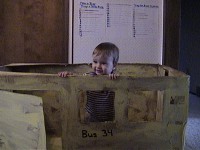 Occasionally throw a cardboard box into the playroom. I've seen toddlers play in a box for a long time. It can be a boat or a car or a train or an airplane or whatever. You can even paint the box and decorate it for even more fun. Basically, once you have left the room and the child realizes that you will not reward his sinful tantrum by coming back in, he settles in and enjoys himself.
Occasionally throw a cardboard box into the playroom. I've seen toddlers play in a box for a long time. It can be a boat or a car or a train or an airplane or whatever. You can even paint the box and decorate it for even more fun. Basically, once you have left the room and the child realizes that you will not reward his sinful tantrum by coming back in, he settles in and enjoys himself.
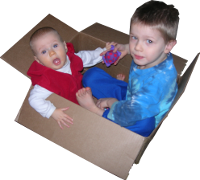 Build up the time little by little. Start with ten minutes, and build up to half an hour. My own children could play for up to a full hour, but they usually had siblings in the room, which brings in the problem of fighting. However, because of all the fun things to do (that are always fresh, interesting, and rotated), there wasn't very much fighting. They were too busy playing.
Build up the time little by little. Start with ten minutes, and build up to half an hour. My own children could play for up to a full hour, but they usually had siblings in the room, which brings in the problem of fighting. However, because of all the fun things to do (that are always fresh, interesting, and rotated), there wasn't very much fighting. They were too busy playing.
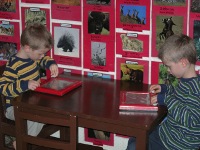 You can also play music in the background. My children learned Bible songs, hymns, countries of the world, patriotic songs, and states and capitals just from listening to CD's. The academic possibilities are endless. Classical music will build their minds as well. Music in the background gives the toddler the impression that people are around, so he doesn't feel lonely.
You can also play music in the background. My children learned Bible songs, hymns, countries of the world, patriotic songs, and states and capitals just from listening to CD's. The academic possibilities are endless. Classical music will build their minds as well. Music in the background gives the toddler the impression that people are around, so he doesn't feel lonely.
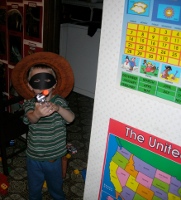 Let me also mention toy rotation. Keep your toy sets in bins, and only take out one at a time. It makes it easier to clean up, since everything in the room can be dumped into one bin. Plus, they haven't seen the toys for a few days, so the toys are fresh. If everything is always open and available, nothing is interesting. People feel refreshed by what they haven't seen in awhile, like spring flowers after a long winter. Toddlers are no different.
Let me also mention toy rotation. Keep your toy sets in bins, and only take out one at a time. It makes it easier to clean up, since everything in the room can be dumped into one bin. Plus, they haven't seen the toys for a few days, so the toys are fresh. If everything is always open and available, nothing is interesting. People feel refreshed by what they haven't seen in awhile, like spring flowers after a long winter. Toddlers are no different.
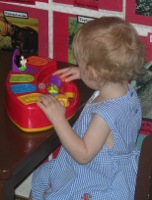 Open-ended toys should be collected, rather than gizmos that only hold attention for two minutes. If you have a headache, there is no reason for your child to set off a loud toy over and over. The toys don't rule you. Put all loud toys away, and take them out only when you are far from them, or when the grandparents who gave your toddler the gift are there. That way everyone is happy, and the home will be more restful. Noise pollution leads to fatigue, and silence can revive.
Open-ended toys should be collected, rather than gizmos that only hold attention for two minutes. If you have a headache, there is no reason for your child to set off a loud toy over and over. The toys don't rule you. Put all loud toys away, and take them out only when you are far from them, or when the grandparents who gave your toddler the gift are there. That way everyone is happy, and the home will be more restful. Noise pollution leads to fatigue, and silence can revive.
By the way, when the child is playing independently, you need to be resting or being refreshed. You should not do chores, especially when your child is napping, unless cleaning the house refreshes you. All my children followed me around and did chores with me since they could walk, and now each of them knows how to clean the house, and they do it because it's a part of life.
In conclusion, if you set up a gated-off playroom for your child with interesting things to do and music, you will buy yourself the energy you need to spend time with God and minister to your husband. It really is worth it.
For more information about water play, click here. For more information about sand play, click here.










